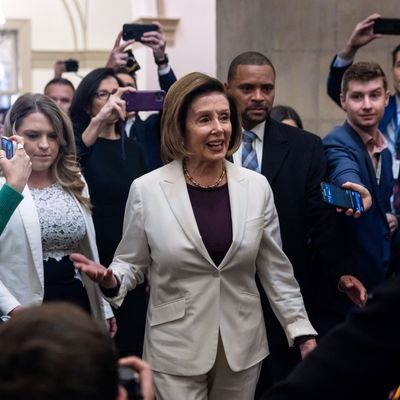
The day after the narrow conquest of the House by Republicans was confirmed, Speaker Nancy Pelosi began a day of business in the lame-duck session currently underway by announcing that she was indeed stepping down as her party’s leader in the chamber before her fellow-Californian Kevin McCarthy takes the gavel for the 118th Congress in January. Pelosi had pledged to step down as leader by the end of the 117th Congress back in December of 2018; it helped her head off a leadership challenge. But with all the many unsettling things that have happened since then, including two presidential impeachments, an attempted insurrectionary attack on the Capitol, and a gut-wrenching midterm election ending in the loss of her House majority, there had been some talk of Pelosi hanging on for a bit longer.
Instead, in a statement on the House floor sprinkled with allusions to the fragility of democracy, the patriotic duties of lawmakers (along with a pointed snub to Donald Trump, whom she did not include in the list of presidents she worked with as Speaker), and the need for national unity, Pelosi announced she would indeed not stand for reelection as leader. She did not clarify her views on her successor in her remarks, but it is well known that she will back New York’s Hakeem Jeffries, currently chairman of the House Democratic Caucus, the No. 4 position in the leadership hierarchy, to give the Caucus fresh and younger leadership.
Thus ends a 20-year Pelosi era among House Democrats. She was the first woman to serve as legislative party leader in either chamber, and as she noted in her announcement, the House is a far more diverse institution now. Four years after she became minority leader, the 2006 Democratic landslide began her first stint as Speaker, which was interrupted by the GOP landslide of 2010. She took back the gavel four years ago after the 2018 midterms. Despite periodic grumbling from younger Democrats about the gerontocracy of their House leadership (with fellow octogenarians Steny Hoyer and Jim Clyburn serving under her in the leadership hierarchy), no one doubted Pelosi’s skill as a legislative leader. She has been both feared and loved, but universally respected, despite her regular appearance as a cartoon villain in Republican campaign ads exploiting the many cultural stereotypes about her beloved city of San Francisco.
There will be time to more fully assess Pelosi’s tenure as leader when the current Congress ends. But it’s noteworthy that during the crucial months in which Presidents Obama and Biden began their administrations, nearly all the legislative trouble occurred in the Senate, not the House. Some of that disparity, of course, stemmed from the Senate’s peculiar rules, including the availability of the filibuster. But some reflected Pelosi’s extraordinary skills, particularly during the last Congress when the tiny margin of Democratic control potentially gave various factions in her caucus the power to thwart her and Joe Biden’s agenda. Now these sorts of headaches will be inherited by Kevin McCarthy, who may ultimately envy Pelosi’s disciplinary powers. It’s unclear if he has a fraction of the strength she showed during the events of January 6, 2021, but he’ll need it.
Pelosi is not, to be clear, leaving Congress; she was recently reelected to a 19th term in the House. She will be around at least for one more term, informally if not formally a Speaker emeritus. No one knows how much her zest for politics and governing was eroded by the difficult year just past, punctuated by the savage attack on her husband in her own house and then the midterm elections that reflected a deeply polarized nation. But her legacy as leader is secure.






























